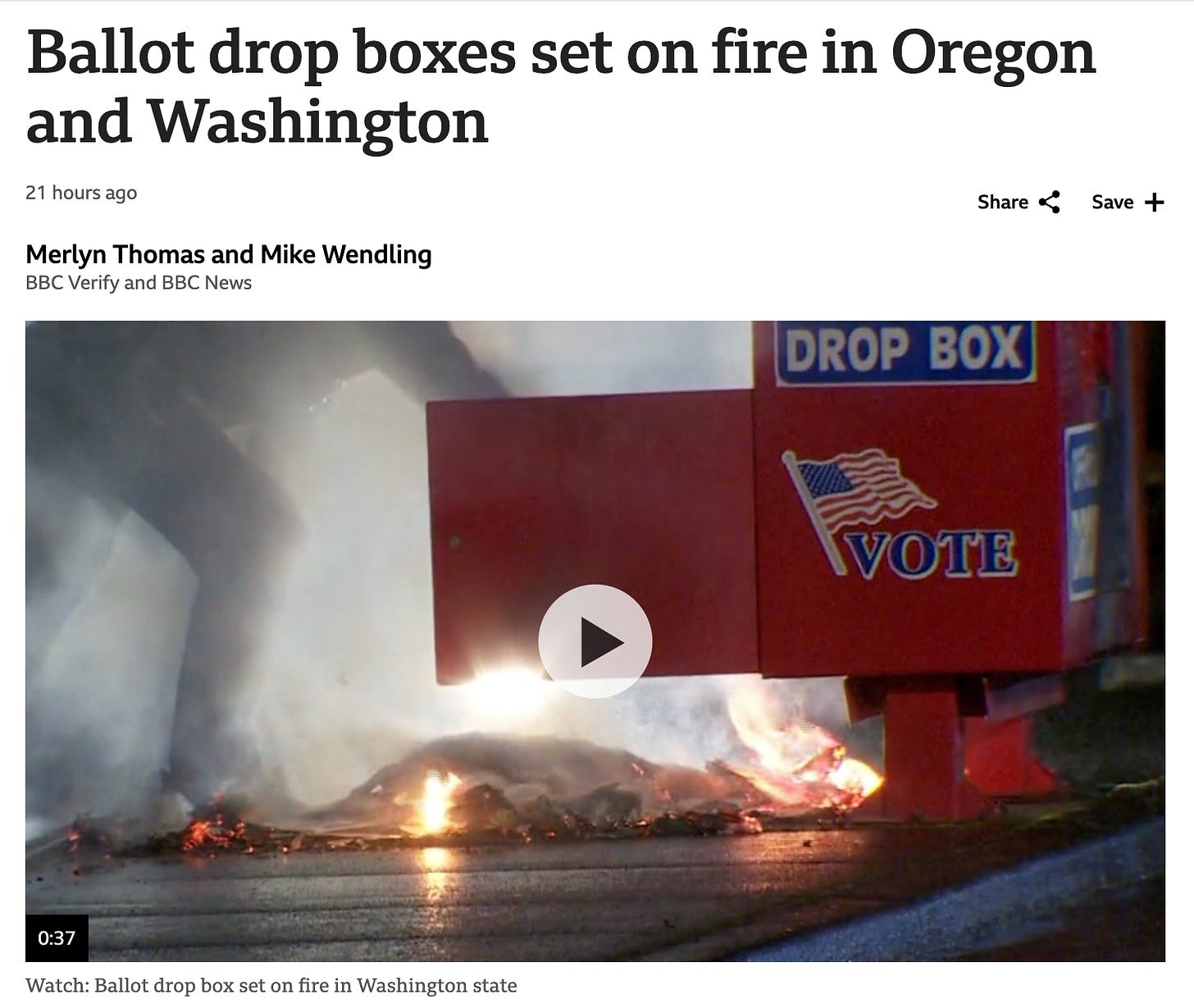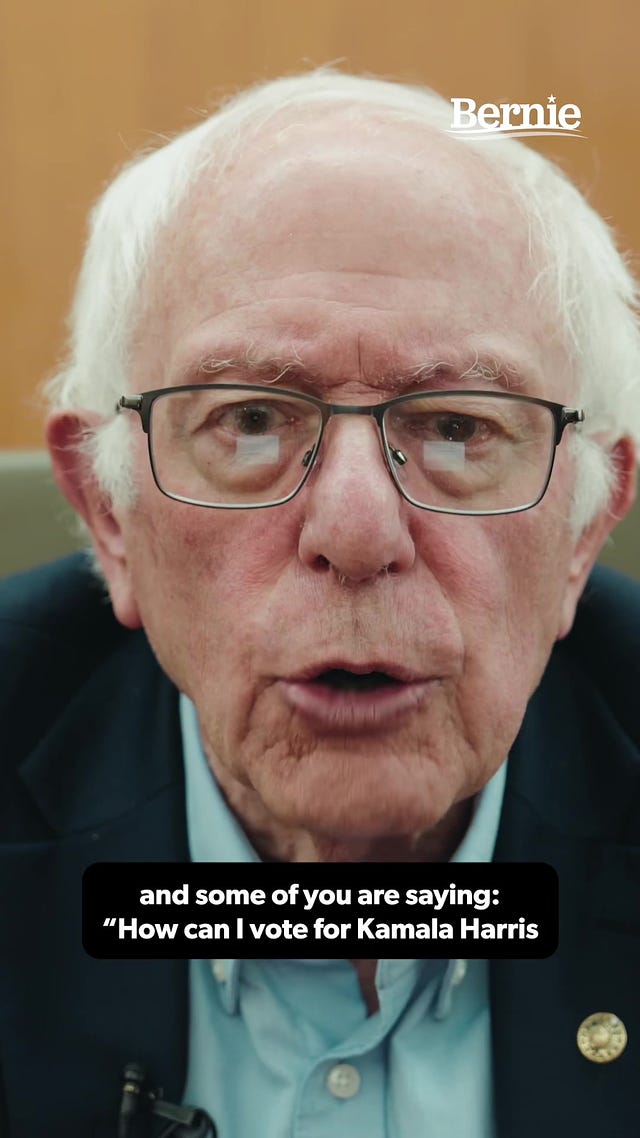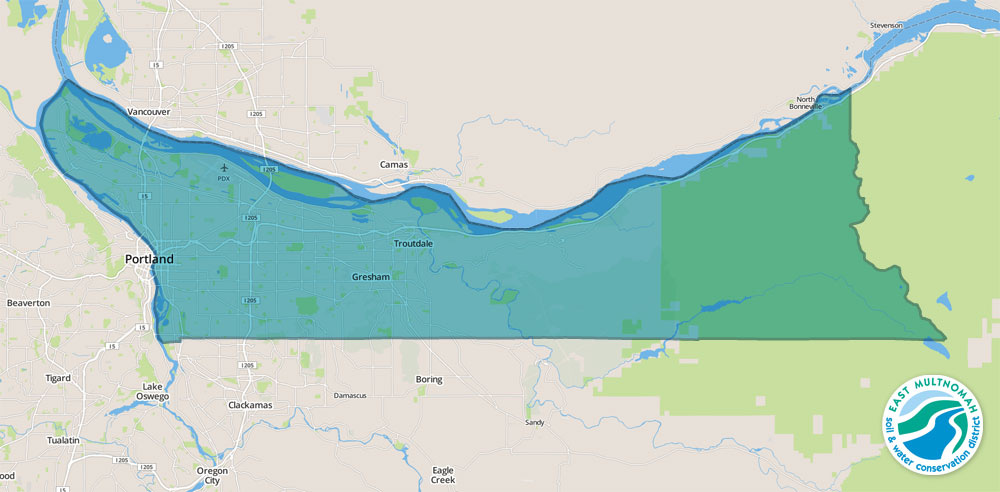Street Wonk Voter Guide Part 2!
Ranked Choice How-To... Voting Deadline and Ballot Boxes... State and County Offices... State and City Ballot Measures... More Voter Resources...
Dear Readers,
Wow! What an incredible response to last week’s issue! The guide received 1000 more views than I have subscribers, was shared and forwarded numerous times, and garnered several new subscribers. I work alone from home and send these newsletters out into the void with a click of a button, not knowing what kind of impact they might have, so this was encouraging. Thank you!
This week, I’m sharing additional information and recommendations on the remaining elections and ballot measures not covered in last week’s guide. I’m also temporarily turning my attention beyond our region to our federal and state-wide elections.
Hoping for the best!
Chloe
Disclaimer: I do my level best to use reliable sources and present accurate information written in accessible language. I make it a habit of providing sources for information I present and to be clear when I’m expressing my own opinion. I also give a final fact-check before publication. However, as with any source, it’s always a good idea to cross reference when researching candidates or important issues.
Ranked-Choice Ballot Support
I’ve heard some grumbling about how confusing the new ranked-choice ballot is. I know change is hard, and those long columns might make your eyes swim, but it is truly easier than it looks. You will find a factsheet insert with your ballot, which includes a website you can visit for more information or practice on a mock ballot, and you can also call 3-1-1 for help.
Voter Info
Election Day is Tuesday, November 5th
After filling out your ballot, place it in the return envelope, seal it, and make sure to sign the ballot return envelope.
Vote by mail: Your ballot must be postmarked on or before Election Day. No postage needed!
Ballot Drop Sites: Your ballot must be dropped at a Multnomah County Official Ballot Drop Box Site no later than 8pm on Election Day
Click here for more information on voting in Oregon
Ballot Box Sabotage
The ballot box fires in Washington and Oregon have made international news. On this side of the Willamette, only three ballots were damaged, but hundreds were destroyed in Washington. While these may be isolated incidents, please consider delivering your ballot to a more secure drop site such as a post office, the Multnomah County Elections Office Building (pedestrian slot on the North side of the building), or Gresham Voting Center Express. Click here for additional official ballot drop sites.
Democracy isn’t perfect, and our choices may not be ideal, but the right to vote is one of the most essential rights we have. It serves as a foundation for participating in and shaping our society. Through voting, we can influence government actions, laws, and policies, which impact all other rights and freedoms. Voting is uniquely powerful in determining leadership and ensuring that elected officials remain accountable to the public.
Interference with voting is anti-democratic and undermines the core principle of democracy: that government should represent the will of the people. Efforts to prevent, manipulate, or intimidate voters, which runs rampant among right-wing zealots who claim to uphold our constitution, disrupt this foundation, preventing citizens from exercising their fundamental right to shape their government.
Additional Voter Resources
I LOVE the Bitchtucci Voter Guide! The November 2024 guide dropped shortly after Street Wonk’s, so if you haven’t gotten enough local elections commentary, here it is! It also includes several great resources used for her vetting process. We have a lot of crossover and some divergences. It’s an entertaining and informative read!
Street Wonk Voter Guide Part 2!
President: Kamala Harris
As a leftist, I’m not bound by party loyalty. If there were a viable third-party candidate aligned with my values, I’d be out there stumping for them. But Jill Stein is not it. I have serious concerns about Harris—her push to make the U.S. military 'the most lethal fighting force' and her unwavering support for Israel are the most glaring among many others. But let’s be clear: the alternative isn’t just bad; it’s exponentially worse. Our choice is between a dangerous authoritarian and a flawed liberal candidate (although likely the most progressive of any President ever elected). Sometimes, the best thing you can do with your vote is mitigate harm, and that’s what I’m doing in 2024.
I respect the rights and opinions of people who see this issue differently, but I have no patience for accusations that a vote for Harris equals a vote for genocide. It’s a manipulative oversimplification that erases the reality we’ll face if Harris loses. It shuts down any real conversation and dismisses the impact of a Trump victory. So, what happens if Trump wins? He’s threatened to deploy the military against dissenters, openly revels in fascism, and caters to a racist, right-wing extremist vision of America. If we’re serious about tackling the U.S.’s flawed foreign policy, he must be defeated because, under a Trump administration, there will be no possibility of progress.
Some voters seem to believe that capturing 5% of the popular vote will create a clear path to third-party viability. While an important milestone, it’s only the beginning of many significant barriers to be overcome. Voting is only one tool in our toolbox—real change takes more than just showing up to the ballot box. It requires relentless organizing, activism, and advocacy from the grassroots up. Unfortunately, I don’t see the Green Party or Jill Stein engaging in the real work that needs to happen. Propping up an unqualified, nonviable candidate every four years doesn’t count.
I am critical of the entire U.S. political system, but the tactical choice we have to make this Election Day seems clear to me—it’s preventing the further decline of our democracy, protecting the working class and marginalized communities, defending reproductive freedoms, preventing Trump from appointing more Supreme Court Justices and protecting space for future organizing and activism. As a former City Commissioner, I voted my conscience to the greatest extent possible, but I also understood that sometimes, I didn’t get to vote for what I wanted but against something worse. There is a time and a place for a principled stand; for me, the risk of a second term for Donald Trump isn’t one of them.
Back to Oregon
Note: I’m voting straight Democrat for all federal and state races. Hence, I’m not providing commentary on them—there’s plenty of information out there if you have any questions. Also, I skipped the races that are uncontested. Oregon Federal Offices
US Representative District 1: Suzanne Bonamici
US Representative District 3: Maxine Dexter (I wish I were voting for Susheela Jayapal)
US Representative District 5: Janelle Bynum
State Offices
Secretary of State: Tobias Read
State Treasurer: Elizabeth Steiner
Attorney General: Dan Rayfield
Contested State Senate Districts in Multnomah County
Senate District 14: Kate Lieber
Senate District 22: Lew Frederick
Senate District 25: Chris Gorsek
Contested State House Districts in Multnomah County
House District 28: Dacia Grayber
House District 31: Jordan Gutierrez
House District 33: Shannon Isadore
House District 34: Lisa Reynolds
House District 41: Mark Gamba
House District 43: Tawna Sanchez
House District 46: Willy Chotzen
House District 48: Hoa Nguyen
House District 49: Zach Hudson
House District 50: Ricki Ruiz
House District 52: Nick Walden Poublon
Non-Partisan State Judiciary
Judge of the Circuit Court, 4th District, Position 38: Jennifer Myrick
This was a tough one for me! We have two excellent candidates, Rachel Philips and Jennifer Myrick.
Jennifer Myrick’s career has bridged prosecution and defense, giving her a balanced view of the justice system. Now a defense attorney, she works with vulnerable populations, including undocumented individuals and people experiencing homelessness, mental health, and addiction issues. She’s deeply invested in connecting defendants with housing, mental health resources, and addiction treatment, seeing these as vital to breaking cycles that lead people back into the system. Myrick has endorsements from advocates for housing and mental health, underscoring her commitment to making the courtroom a place of solutions, not just punishment.
Rachel Philips: Philips is a long-time defense attorney and victim advocate, and her work focuses on improving the efficiency of the court system for all parties, especially for crime victims. She’s testified to the Oregon Legislature about the negative impacts of delays in criminal cases and has pushed for quicker case resolutions to help both victims and defendants move forward. Philips brings experience across several counties in Oregon and a strong advocacy background for systemic reforms.
Why I’m Voting for Myrick: I’m going with Myrick because she’s focused on addressing the root causes that bring people into the courtroom—things like homelessness, addiction, and mental health struggles. Her approach feels grounded in empathy and a vision of justice that supports people instead of just processing them. I appreciate Philips' focus on efficiency and victims' rights, but Myrick's commitment to making the court a space for connecting individuals with resources resonates with what I think our community needs right now.
Multnomah Soil & Water Conservation District
“The East Multnomah Soil and Water Conservation District (EMSWCD) is a unit of local government serving Northwest Oregon's Multnomah County east of the Willamette River. We work entirely on a voluntary, non-regulatory basis. All of our work is geared toward keeping water clean, conserving water and keeping soil healthy!”
East Multnomah Soil and Water Conservation District, At-Large, Position 1 Director: Ramona DeNiles
There’s only one uncontested seat in this race. Although Ramona DeNiles is a relative unknown, I liked her Voters’ Guide statement, and because I know environmentalists have been unhappy with the incumbent, my vote is going to her.
Urban Flood Safety and Water Quality District
“The Urban Flood Safety & Water Quality District (UFSWQD) helps protect lives and property from flooding by operating and maintaining flood management systems for nearly 13,000 acres of land along the Columbia Slough and the lower Columbia River.”
It’s frustrating how difficult it is to find helpful information on these races. There’s limited information, including endorsements. Some candidates on the ballot don’t appear in the Voters’ Pamphlet, which is a disqualification in my book. Based on the Voters’ Pamphlet and what I was able to glean from sites like the Oregon League of Conservation Voters and League of Women Voters of Portland, these are my recommendations.
Position 2 Director: Ariana Johnson
Position 3 Director: Kayla Drozd Calkins
Position 4 Director: Nic Lane
Position 5 Director: Erich Mueller
State Legislative Measures
Five statewide measures were referred to the ballot:
Measure 115: Allow the Oregon Legislature to impeach statewide elected officials. YES ✅
Summary: Oregon is the only state without an impeachment process for executive officials, relying solely on recall elections for removal. This amendment would allow the Oregon House to impeach officials like the Governor, Secretary of State, and Attorney General for serious misconduct, including malfeasance, corruption, or neglect of duty. Impeachment would require a two-thirds House vote, with the Senate conducting a trial overseen by the Chief Justice. A conviction would require a two-thirds Senate vote, leading to removal and disqualification from future public office.
Opinion: Measure 115 strengthens accountability by introducing an essential mechanism for handling serious misconduct. It ensures Oregon has a clear process to uphold public trust and respond to breaches in office, aligning with every other state in the country.
Measure 116: Create an Independent Public Service Compensation Commission to set salaries for certain state officials. YES ✅
Summary: This measure establishes an independent commission to set salaries for officials, including the Governor, Secretary of State, and state judges, ending legislative control over these salaries. The commission would have members unaffiliated with the state government, such as state employees, lobbyists, or their immediate families, and the General Fund would cover its salary decisions without further appropriation.
Opinion: Measure 116 addresses a critical issue in Oregon governance: fair compensation for high-demand public service roles. Low salaries limit representation by deterring qualified, economically diverse candidates from running. This independent commission would ensure salaries are objectively set, making public service accessible to all qualified candidates without financial barriers.
Measure 117: Allow voters to rank candidates in order of preference, with a majority deciding the winner. YES ✅
Summary: This measure introduces ranked-choice voting (RCV) for offices like President, U.S. Senator, and Governor, allowing voters to rank multiple candidates in order of preference. If no candidate wins a majority, rounds of counting will eliminate the lowest-ranked candidates and redistribute their votes until one candidate achieves a majority. The Secretary of State would also implement a voter education program, and local governments could adopt RCV starting in 2028.
Opinion: Measure 117 promotes fairer elections by ensuring that winning candidates have broad support and gives voters greater flexibility. RCV can reduce polarization and encourage a more representative choice. Oregon would join other states and cities that are already using this method for fairer, more inclusive elections.
Measure 118: Increase corporate minimum taxes on high sales in Oregon, with revenue distributed to residents. NO ❌
Summary: This measure would raise corporate minimum taxes for companies with Oregon sales over $25 million, remove the tax cap, and distribute the revenue to Oregon residents. These distributions would not affect eligibility for state benefits, and the state would replace any reduced federal benefits.
Opinion: Although I support corporate accountability and fair tax contributions, Measure 118 is a piecemeal approach to systemic tax reform. Oregon needs comprehensive economic solutions that address urgent issues like affordable housing, mental health services, and infrastructure repair. Broad tax reform should ensure corporate contributions support the areas most in need.
Measure 119: Cannabis retailers and processors must stay neutral regarding employee communications with labor organizations; penalties apply for noncompliance. YES ✅
Summary: This measure requires cannabis businesses to sign agreements with labor organizations to remain neutral when discussing collective bargaining with employees. The Oregon Liquor and Cannabis Commission would enforce compliance, with penalties for noncompliance, including fines or possible loss of licensing.
Opinion: Measure 119 is a crucial step toward fair labor practices in Oregon’s cannabis industry. By requiring employer neutrality, the measure empowers workers to explore union representation freely. It promotes an equitable workplace and sets a positive standard in Oregon’s expanding cannabis sector.
City of Portland Measures
The Charter Commission referred five measures to the ballot for November 2024. Their work has brought numerous improvements to our outdated Charter, including changing our form of City government. Here are five more items, mostly modernizing, streamlining, and housekeeping issues, they’re recommending to voters this time around.
YES TO ALL OF THEM ✅
Measure 26-249: Streamline City Council’s approval of utility franchise agreements. This measure removes outdated requirements in Portland's City Charter for utility franchises, including redundant filings, the objection process, newspaper publication, delayed ordinance readings, and extended effective dates. Instead, franchises would be approved by ordinance, following standard procedures for publication, public testimony, adoption, and effective dates as outlined in the Charter and city code. The City Budget Office found no direct financial impact for this measure. YES ✅
Measure 26-250: Establish an Independent Portland Elections Commission in the City Charter to oversee election programs. This measure would add the Elections Commission to the Charter, making it amendable only by voter approval rather than by City Council changes. The Commission would continue to manage public financing for city elections and may oversee other election-related programs as assigned. Composed of nine city residents appointed by the Mayor and confirmed by Council, the Commission would also inform Council of budget needs for election programs. YES ✅
Measure 26-251: Update City authority over recreational and natural areas, sewers, and stormwater systems. This measure modernizes city management powers outlined in the Charter, adding 'recreational and natural areas' to cover parks, playgrounds, forests, wetlands, and similar spaces. It clarifies that the City may manage stormwater and sewer flow in natural and constructed waterways, floodplains, and wetlands and allows the use of natural or constructed systems for storm drainage. The measure also streamlines language on sewage fund management, ensuring funds remain for sewage and stormwater-related expenses. YES ✅
Measure 26-252: Remove outdated language and establish a consistent definition for 'protected classes' in the City Charter. This measure deletes vague language, such as prohibitions on 'roaming the streets at unseasonable hours' and 'offensive' businesses, while preserving the City's authority over public health, safety, and nuisance regulations. It also standardizes the definition of 'protected classes' across the Charter to align with local, state, and federal protections and replaces 'disability' with 'incapacity' to affirm that disabled residents can serve as City officials. YES ✅
Measure 26-253: Permit the City to require weatherization of buildings constructed before 1979 without a citywide vote. This measure removes a Charter provision that currently prevents the City from enforcing weatherization mandates on structures built before September 1, 1979, unless approved by voters. If passed, City Council could implement weatherization requirements for these older buildings directly. YES ✅









Thanks again! Taking my ballot to the post office TODAY!!!